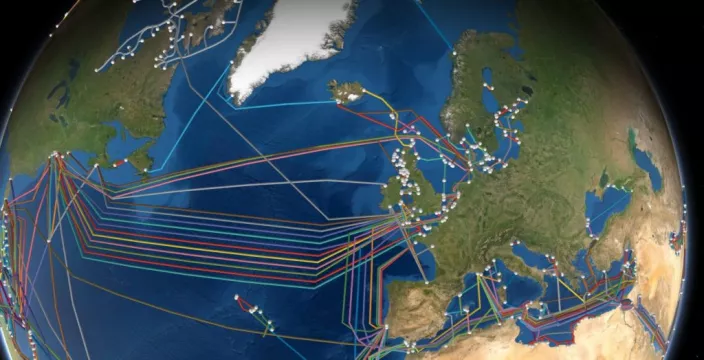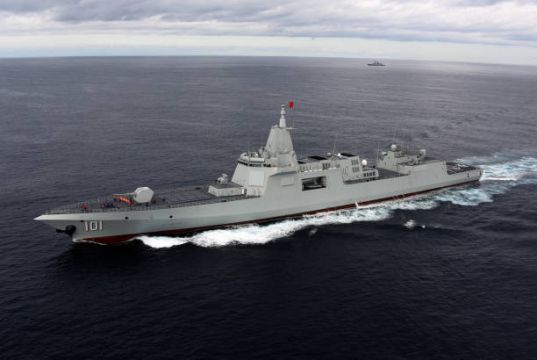As Russia continues to bolster its military presence along the Ukrainian border, news broke over the weekend that the Russian military plan to carry out live missile exercises off the coast of Ireland next month.
While these exercises will not take place in Irish waters, they will be in Ireland's Exclusive Economic Zone (EEZ) where many ships travelling to Europe pass through.
Russia has called them 'routine' exercises, but many claim they aim to put pressure on the EU as they look to sanction Russia for their aggression towards Ukraine.
What exactly is Russia planning?
Live exercises by the Russian navy and air force in the Atlantic are to take place 240 kilometres (150 miles) off the Irish south-west coast.
This week they will start deploying 140 warships and about 10,000 sailors around the world to take part in naval exercises expected to last several weeks.
Similar to how Russia is conducting military drills on the Ukrainian border, the artillery drills serve as a visual symbol of Russia's military might.
Are these drills legal?
As The Irish Times reports, despite being in Ireland's EEZ, there is nothing illegal about these drills because they are technically taking place in international waters as opposed to Irish waters.
Russia has also officially informed the Irish authorities about the plans in order to minimise the risk to air and sea traffic.
What has Ireland's response been?
Not surprisingly, the Irish Government has not welcomed the move from Russia and given the current context with Ukraine, they are worried it further raises tensions between the EU and Russia.
Foreign Affairs Minister, Simon Coveney has said plans by Russia to hold navy military exercises off the coast of Ireland are “not welcome”.
Mr Coveney said Ireland does not have the powers to prevent it from happening.
Speaking ahead of a meeting of EU foreign ministers, Mr Coveney said: “I have made it clear to the Russian Ambassador in Ireland (Yury Filatov) that it’s not welcome.
“This is not a time to increase military activity and tension in the context of what is happening with and in Ukraine at the moment."
Why is it happening off the Irish coast?
According to Sinn Féin's spokesperson on defence, Sorca Clarke a lack of primary radar "is the reason other state entities have been probing our airspace for years with high-altitude bombers and escorts. These foreign aircraft can see us, but we cannot see them."
Also, Irish Defence Forces have had staffing issues in recent years as Ms Clarke said these drills "are placing increased pressure on our already over-stretched Defence Forces that successive governments have failed to invest in and support properly.”
Ireland is the only country on Europe’s west coast which lacks a primary radar system, meaning air traffic control can only see aircraft that want to be seen, namely those who have their transponders turned on.
“While the 2015 White Paper recognises that radar surveillance is a priority, there has been no meaningful action by government since then to deliver on it," Ms Clarke said.
This area is also seen as a blindspot due to the lack of radar system which Russia is attempting to point out to the EU.
What has Russia's response been?
Russia's ambassador to Ireland recently said plans by Russia to hold navy military exercises off the coast of Ireland are a “non-story”.
At a press conference in the Russian Embassy on Monday, Yury Filatov downplayed the significance of the navy exercises after concerns were raised by the Government.
At the press conference, Mr Filatov said: “It has been hugely overblown. These exercises are part of the yearly plan of naval activity for 2022..
“No harm is intended and no problem is expected. All that has been communicated to our colleagues at the Department of Foreign Affairs of Ireland."
He added: “It looks like the topic of exercises fits in the ongoing propaganda campaign waged by the US and its Nato allies to create an illusion of a Russian threat to Ukraine.
How does it fit into the situation in Ukraine?
In March 2014 Russia invaded an area of Ukraine called Crimea after Ukrainian president Viktor Yanukovych was ousted after the Ukrainian revolution.
There are a lot ethnically Russian people who live in that area and on March 18th they annexed Crimea incorporating the Republic of Crimea, who declared its independence from Ukraine after a highly disputed referendum months earlier.
More recently Russia has amassed thousands of soldiers along the Ukrainian border as the conflict between the two countries continue. Ukraine has also deployed soldiers along their border as a form of retaliation.
What does it mean for Ireland?
As fears grow over the possibility of Russia invading Ukraine, there is also concern about where Russia has decided to do these drills.
As the map down below shows, there are a number of underwater cables stretching across the Atlantic not far from where the drills are taking place.
This underwater infrastructure runs along the southern coast and connect Europe and North America.
The drills are due to take place directly above the nexus of many of the Internet cables which connect the two continents. Cutting them would immediately cripple the economies of Nato countries as well as Ireland.
Cutting the cables was described by one naval source as “the perfect counterpunch” against any Nato or US military response in Ukraine. “If I wanted to invade Ukraine and hamstring my opponents, I would want to cut those cables. It would be lights out for the economy of western Europe.
A Government source told The Irish Times, however, that such an action by Russia is “considered extremely unlikely”.
[caption id="attachment_1248366" align="aligncenter" width="704"]







